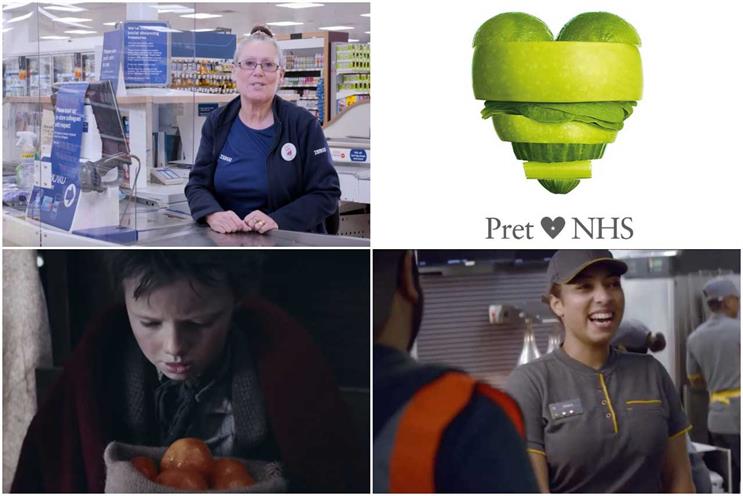
In bad times, a brand’s treatment of employees can influence consumer perception. Indeed, research from Kantar’s Covid-19 Barometer, an ongoing study of how Covid-19 is influencing consumer behaviour, attitudes and expectations that covers more than 30 markets, found that consumers believe staff welfare should be a company’s first priority.
"Providing a safe environment for staff" and "enabling them to work flexibly" were the top two concerns named by consumers when asked how companies should be responding. They came ahead of "stabilising the supply chain" or "offering consumer promotions and discounts".
While brands such as JD Wetherspoon, Sports Direct and Virgin Atlantic have been lambasted for their actions towards employees, others such as Sainsbury’s, Tesco, McDonald’s and Pret a Manger have been celebrated for protecting the personal safety of employees, even at the expense of profits.
But to what extent does this get remembered in good times and just how long does the devil or halo effect live on in the minds of consumers? ±±ľ©Čüłµpk10 asked adland’s finest.
 Les Binet
Les Binet
Group head of effectiveness, Adam & Eve/DDB
The primary thing is that companies should focus on doing what's right for their customers, what’s right for the country and also what’s right for their staff. Firms have got to survive but, you know, people will remember that there are some companies that have just cut all their staff off without a penny. People like the lovely chap from a certain pub chain, who said he's not paying anyone.
 Craig Mawdsley
Craig Mawdsley
Chief strategy officer, Abbott Mead Vickers BBDO
I think people will have very, very short memories. All the controversies that you get around things like Sports Direct; people get themselves worked up on Twitter about that stuff, but I think once you get the other side of this, people forget.
There's a theory emerging, which I'm not sure is going to be true, that says all the brands that did something helpful in the crisis will be rewarded, but brands that didn't do things to help people will be punished.
I suspect that because people are spending 99% of their time thinking about whether they're going to get sick and whether they're going to get fired, I don't think they’re going to be spending too much time remembering which of the brands have treated employees well and which ones didn't.
And there hasn't been a sort of massive, egregious single issue that will stick in people's minds. It's been lots and lots of brands doing little good things, which is great. There have been lots of brands doing sort of bad things, which is terrible, but I don't think people were paying that much attention because there's so many more other pressing concerns on their mind.
We, as an industry, spend too much time staring at what brands are doing, but most people don't really care.
Jane Ostler
Global head of media, insights division, Kantar
Our findings point towards the new environment, in which companies will be judged on the way they treat people; their staff, their customers and society as a whole. In this context, and in the one that will follow Covid-19, the approach of valuing profit over people just won’t cut it. People have long memories and we will not forget the way in which companies treat their staff throughout the next few months.
 Richard Storey
Richard Storey
Global chief strategy officer, M&C Saatchi
This whole crisis is an acid test for brands and people will remember how they’ve behaved. It’s a chance for them to show empathy and humanity, like McDonald’s and Pret a Manger, which both admirably took the difficult commercial decision to close their doors to protect their employees, at a time when they could have carried on offering a takeaway service.
Adrian Walcott
Managing director, Brands with Values
These are the moments when brands will be judged. Post-recession will be their biggest opportunity to differentiate a brand or service, because they’re going to be managing employees through turmoil and trying to get them to align on brand purpose, which is going to have the biggest impact on how the brand comes across to customers. This is when you really get to see what culture you really have – it's all stripped bare at the moment.
The watchpoint for brands is if it’s perceived negatively, particularly in the way it treats employees, that’s going to give a signal to consumers and you may well lose some of your fans. Especially if you're one of these big brands who’s got armies of employees. These armies of employees have friends and families, who are purchasers of the brand and may well have some sort of empathy with the way employees are being treated, and it may have an impact on their future ability to drive revenues and greater engagement. Brands will be judged on how they treat their people.
Patrick Fagan
Co-founder and chief science officer, Capuchin
People have very short attention spans and also, including myself, are quite lazy. We have limited attention spans and limited cognitive resources and time, energy and money. So, when the Deepwater Horizon oil spill happened with BP, it didn't really affect their [BP's] market share. Because, you know, people are probably not thinking about that day to day and probably aren't going to drive another 15 minutes just to get petrol somewhere else.






.jpg)
.jpeg)
